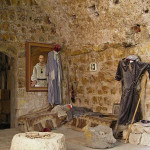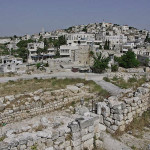Supper at Emmaus
Caravaggio painted this second version of the
Supper at Emmaus in 1606. It is more modest than his most famous painting of
1601.
By comparison, the
gestures of figures are far more restrained, making presence more important
than performance. This difference possibly reflects the circumstances of
Caravaggio's life at that point, recognising the ongoing evolution of his art.
In the intervening five years he had come to recognise the value of
understatement.
The narrative is well known:
The two men at the sides
of the table suddenly realize that the man they have spent most of the
afternoon with is their deceased master. One of them raises his hands, the
other clutches the table. The innkeeper and his wife remain calm, as they do
not know what is happening.
 And it occurred that as He reclined at table
with them, He took [a loaf of] bread and praised [God] and gave thanks and
asked a blessing, and then broke it and was giving it to them when their eyes were [instantly] opened and they
[clearly] recognized Him, and He vanished (departed invisibly). Luke 24:30. (1 Corinthians10:16)
And it occurred that as He reclined at table
with them, He took [a loaf of] bread and praised [God] and gave thanks and
asked a blessing, and then broke it and was giving it to them when their eyes were [instantly] opened and they
[clearly] recognized Him, and He vanished (departed invisibly). Luke 24:30. (1 Corinthians10:16)
Easter Greetings
The
cup of blessing [of wine at the Lord’s Supper] upon which we ask [God’s] blessing,
does it not mean [that in drinking it] we participate in and share a fellowship
(a communion) in the blood of Christ (the Messiah)? The bread which we break,
does it not mean [that in eating it] we participate in and share a fellowship
(a communion) in the body of Christ?
[Amplified Bible translations]
An Unnamed Disciple
After the days of the Passion of Our Lord,
we have need to leave the turmoil in Jerusalem and take to the road to Emmaus,
to become one with the two disciples, in order to reflect upon ‘the things that
have occurred there in these days’1. On our journey we will meet the Risen
Christ in a deeply personal way, for only He can guide us in our understanding
of the meaning of His Passion and reveal Himself to us. At the inn of Emmaus,
the stranger is revealed and recognized to be the Risen Lord as He breaks bread
before Cleopas and his companion, an unnamed disciple.
Luke
24:15 And while they were conversing and discussing together, Jesus
Himself caught up with them and was already accompanying them [AMP translation]
I love to remain hidden upon the hillside
remembering that night
Watching silently as You made Your Way
through the olive groves,
Sensing the foreboding of the disciples
from whom You had withdrawn,
Their hearts sharing Your Mother’s fears
as to where all this was leading
As the shadows
lengthened and the darkness of that night descended
They lay
exhausted, their sacred source of energy deserting them,
Unable to
comprehend Your ‘baptism’2 of
which You had forewarned,
Attending only
to the whispering trees that told of all that was to befall
I witnessed
Your final hours as the sword pierced through the soul of Mary3
The portents
and earthquake telling of the death of her beloved son and Lord
The livid force
of evil exacting its final cruel vengeance upon You,
Stunning me with
terror as I turned unseen and fled along the open road…
Along the way I
was startled by a stranger who brought my Lord to life for me
Discovering the
meaning in the Scriptures of the suffering of the Messiah,
Revealing
Yourself in a moment of recognition as You broke the bread
Manifesting
Your Eucharist presence to one who remains an unnamed disciple
1 Lk 24:18 2 Lk 12:50 3 Lk 2:35
Luke 24:30
And it occurred that as He reclined at table with them, He took a loaf of bread
and praised God and gave thanks and asked a blessing, and then broke it and was
giving it to them when their eyes were instantly opened and they clearly
recognized Him...[AMP]
2 Cor
4:6b… the knowledge of the majesty and
glory of God as it is manifest
in the Person and is revealed
in the face of Jesus Christ the Messiah [AMP]
Key words: of the Messiah: Your Way, withdrawn,
‘baptism’, revealing, manifesting
of Mary: Mother’s fears, pierced
through, death of her beloved son and Lord
of the Disciples: foreboding,
exhausted, …deserting, unable to comprehend
of the events: all this (preceding), all that (following)
of the one unnamed: remain hidden,
witnessed, unse
William - POEM, ‘my jotting’









+a.jpg)
+b.jpg)
+c.jpg)





